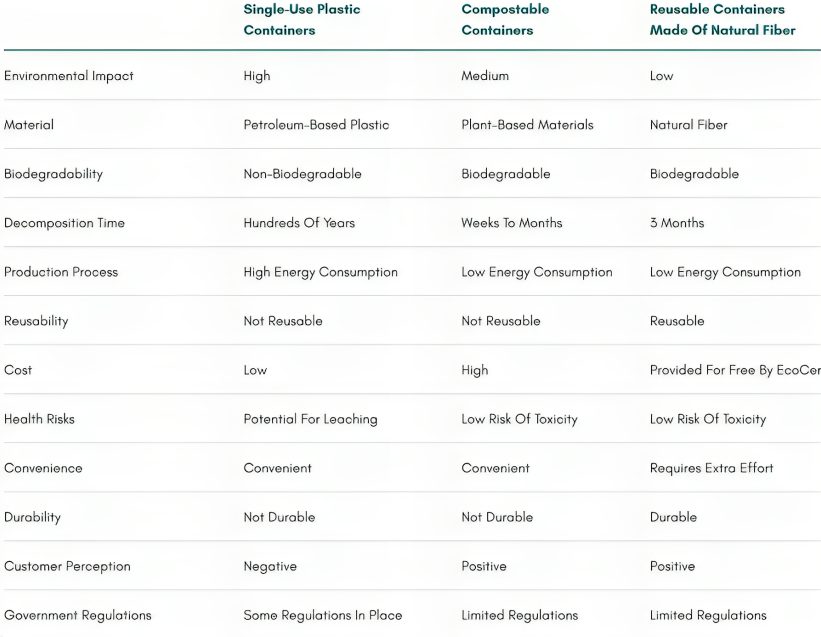
Shop eco-friendly with EcoCentric, paving the green path
Facts & Figures
Comparison Table between Single-Use Plastic Containers, Compostable Containers, and Reusable Containers Made of natural fiber.
Containers
Containers
Made of natural fiber
Biodegradability
Decomposition Time
Non-biodegradable
Hundreds of years
Biodegradable
Weeks to months
Biodegradable
3 months
Convenient
Customer Perception
Government Regulations
Negative
Some regulations in place
Positive
Limited regulations
Positive
Limited regulations
Every year we can eliminate
It's time for a change!
At EcoCentric, we’re committed to sustainability and the environment. We believe in making it easy for you to shop and make eco-friendly choices.
Did you know that 8.3 billion tons of plastic have been made since the 1950s, with only 9% being recycled? Shocking, right? We’re here to change that.
We offer a closed-loop delivery system that makes it easy for you to shop sustainably.
This year alone, 300 million tons of plastic will be made, with more than half intended to be single-use. That’s where we come in. We offer a variety of
products that are eco-friendly and made without the use of fossil fuels.
The most common sources of plastic waste in the oceans are single-use items associated with food packaging and takeout meals. That’s why we offer
alternatives to these items that are just as convenient, but without the harmful impact on the environment.
When plastics degrade they release potentially harmful airborne microplastics which enter the food chain and contaminate drinking water. The
long-term impact of exposure is completely unknown right now

Hygiene
At EcoCentric, we’re committed to sustainability and the environment, but we know that hygiene is a top priority for everyone. That’s why we’re
dedicated to ensuring that our Eco-Packs are not only eco-friendly but also completely hygienic.
We understand that there may be concerns about the hygiene of reusable containers, but we want to assure you that we take hygiene very seriously.
We’re working on a quality system that eliminates any risk associated with cleaning and sanitization, so you can enjoy your food without any worries.
Vendors are responsible for the hygiene of the containers, just like they are for their dine-in plates, glasses, or cooking utensils. They simply add them
to their existing load of the dishwasher, which cleans and sanitizes the reusables, making them ready for the next order.
We believe that sustainability and convenience can go hand in hand, and our closed-loop delivery system is a perfect example of this. By choosing
EcoCentric, you’re not only making a sustainable choice but also a convenient one. You can have your food delivered in eco-friendly containers without
worrying about hygiene.
Join us in making a difference
By choosing EcoCentric, you’re taking a step towards a more sustainable and hygienic future. Just follow the steps below to become a vendor.
- Submit an application
- Attend an interview
- Start delivering meals
- Meet our criteria
- Sign an agreement

Health and the Reuse Revolution: Is disposable safer than reusable? Let’s consult the science

